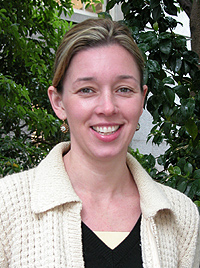Berkeleyan
American Cultures looks ahead
Undergraduate courses in a surprising range of subject areas articulate the many cultures that have shaped the United States
![]()
| 31 March 2005
In 1987, Berkeley students agitated for a new graduation requirement that would factor in the myriad voices and views of an increasingly diverse campus population. They aired their demands at rallies on the steps of Sproul Hall and also occupied the Faculty Club, in an effort to persuade reticent academics to vote in favor of a proposed ethnic studies requirement. Their fight reached a happy conclusion in 1989 when the Academic Senate approved the American Cultures (AC) requirement. Sixteen years later, AC courses are still addressing the diversity-related issues that remain front and center on the Berkeley campus. [Editor's note: For Chancellor Birgeneau's views on this subject, see the Q&A and an opinion piece in the March 31 Berkeleyan.]
Exploring American cultures, one course at a time Taeku Lee's "Introduction to American Politics" Leslea Hlusko's "Human Biological Variation" George Brimhall's "Crossroads of Earth Resources and Society"
|
As stipulated by the Academic Senate guidelines, such courses must focus on at least three of five groups - indigenous peoples of the United States, African Americans, Asian Americans, Chicano/Latino Americans, and European Americans - by employing a theoretical and analytical approach to race, culture, and ethnicity while also exploring the groups' role within or in relation to the United States. A Senate subcommittee reviews course proposals and determines whether they meet the intent of the guidelines.
 "Race is messy; it's not black and white," says Victoria Robinson, the new coordinator of the campus's American Cultures center. (Wendy Edelstein photo) |
An ethnic-studies lecturer at Berkeley for six years, Robinson brings the kind of passion to her new position that's born of experience. In AC courses, students can be introduced to the notion that race and ethnicity are part of the social structure, an understanding that Robinson says can best be fostered if they take the requirement early in their academic career. She's "constantly amazed" by what her students "don't know and what they assume and anticipate. There's so much work to be done in education and exposure to knowledge. We have 15 weeks to give voice to other narratives and other lives, and to make sure everybody realizes how attached they are to their own."
Incorporating 'places of understanding'
Because approval of an AC course is predicated on the participation of a specific faculty member, attrition occurs within course offerings as faculty retire or leave the university. Thus it's incumbent upon Robinson to, first, find new faculty whose research interests might dovetail with the American Cultures guidelines, and then meet with them to explain the requirement. Just several months into the job, Robinson reports that faculty members' overall response has been "fantastic. Many of them have AC under their belt intellectually, which is allowing us to expand our program."
Faculty departures aren't the only reason to develop new AC courses. Scholarship in the areas of race, ethnicity, and culture has changed, says Robinson, making it critical to create new courses to "incorporate those places of understanding, so that the requirement stays very, very relevant."
Maslach calls American Cultures "a signature aspect of the Berkeley curriculum" and notes that it is "recognized as a national model. What's exciting," she adds, "is the way that the curriculum is continuing to expand and transform as faculty bring the latest cutting-edge interdisciplinary research into the classroom."
To date, faculty members across 40 disciplines have developed more than 530 American Cultures courses, ranging in size from 15-student seminars to gateway courses enrolling 750 undergrads. Since the requirement was initiated, 110,000 Berkeley students have satisfied the breadth requirement by taking an AC course during their undergraduate careers.
Robinson, with the help of the AC advisory board, is reaching out to chairs of departments that have a shorter AC track record, to convey the requirement's possibilities for their faculty. She describes the advisory board as "an amazing group of people who are emblematic of how scholarship has changed on campus. At Berkeley now, everybody talks about culture."
"We have more courses now that fulfill the requirement in less obvious disciplines," Robinson continues, noting that many of the new AC courses fall outside of the College of Letters & Science. In the past six months alone, three new courses were added in political science, a discipline that hasn't offered many such courses in the past and that appeals to students both within and outside the department.
Robinson may be the ideal ambassador to spread the benefits of American Cultures to the far reaches of campus. She relates that two science majors came to her office recently, claiming that her ethnic-studies course "had opened their eyes.That's what AC does every time it's taught, whatever discipline it's taught in," she notes.
"AC gives students a framework of social justice, which is not just transformative for them but affects the communities they enter," Robinson continues. "Students no longer automatically assume - they actually listen." For the students themselves that might be "a small thing," she says, but "we need to make good civic and social leaders out of our students. They can't possibly take on those roles if they don't have the ability to listen and learn."
American Cultures guidelines are available at amercult.Berkeley.edu/instructor_guidelines.html. Faculty who wish to develop AC courses can contact Victoria Robinson at victoriarobbi@berkeley.edu.

